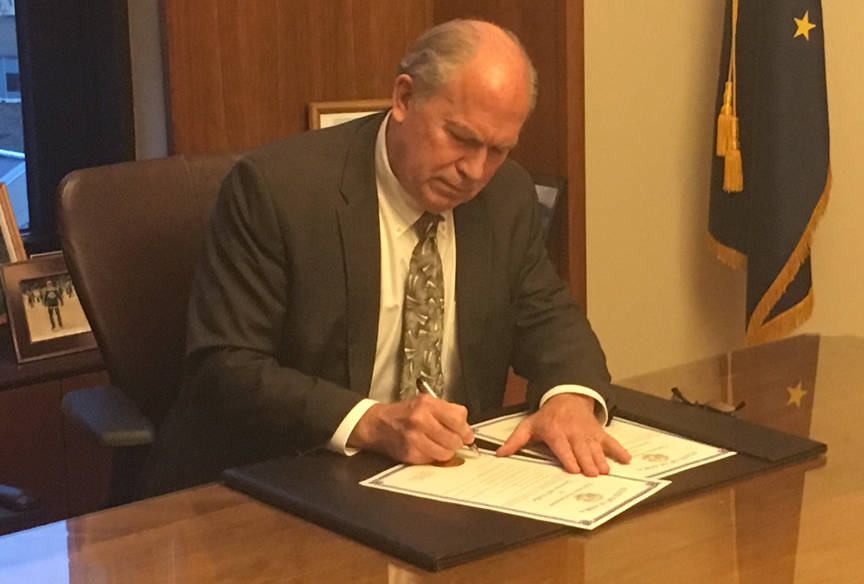The Alaska Legislature is headed into a special session.
On Wednesday night, the Alaska House of Representatives and Alaska Senate adjourned the first regular session of the 30th Alaska Legislature without finishing a budget and without finding a way to pay for that budget.
Minutes after the House and Senate adjourned, Gov. Bill Walker called lawmakers into a special session starting at 11 a.m. Thursday.
I call the Thirtieth Legislature of the State of Alaska into its first special session in Juneau, Alaska on May 18 @ 11AM. -BW #akleg #akgov pic.twitter.com/PSsqLC3MWI
— Governor Bill Walker (@AkGovBillWalker) May 18, 2017
On Walker’s agenda for the special session are a series of budget-related items and measures addressing Alaska’s prescription drug abuse epidemic.
Walker has asked lawmakers to consider the state’s operating budget, its capital construction budget, a hike in the state’s gasoline tax, cuts to the state subsidy of oil and gas drilling, spending from the earnings of the Alaska Permanent Fund, and “an act or acts to increase an existing tax or to establish a new broad-based tax.”
Lawmakers are not required to pass legislation dealing with all of these subjects, but they are limited to what’s on the governor’s agenda and cannot add any other items.
According to the Alaska Constitution, the governor can call lawmakers back into session for 30 days. If they still fail to pass a budget, Walker can repeat the process, but a deadline looms.
July 1 is the start of the state’s fiscal year, and without a fiscal fix, state government will shut down.
Throughout the regular session, lawmakers were divided on the proper way to fix the state’s $2.7 billion annual deficit.
The coalition House Majority proposed a four-part plan including a state income tax, cuts to the state subsidy of oil and gas drilling, spending from the Permanent Fund’s investment earnings, and modest budget cuts.
Had the House Majority’s plan been fully enacted, it would have eradicated the deficit by 2020.
The Republican-led Senate Majority rejected the House plan in favor of its own. The Senate approach includes spending from the Permanent Fund’s investment earnings and steep budget cuts.
The Senate approach doesn’t completely eliminate the state deficit; it merely reduces it to levels sustainable for at least a decade.
Senators said they view a structural deficit as a feature, not a bug, since it will keep pressure on lawmakers to keep spending low.
The House rejected that idea and kept up a call for a complete fix to the deficit. It had support from Walker, who was much quieter on the topic than he was in 2016.
Late in the regular session, the Senate solidified its position by voting down the House’s proposed income tax, all but killing the idea for the year.
Entering the special session, the House and Senate have each drafted their own versions of the state operating budget, a Permanent Fund spending plan, and a plan to cut oil and gas drilling subsidies. The House has not yet completed work on its version of the capital construction budget.
Contact reporter James Brooks at james.k.brooks@juneauempire.com or call 419-7732.

